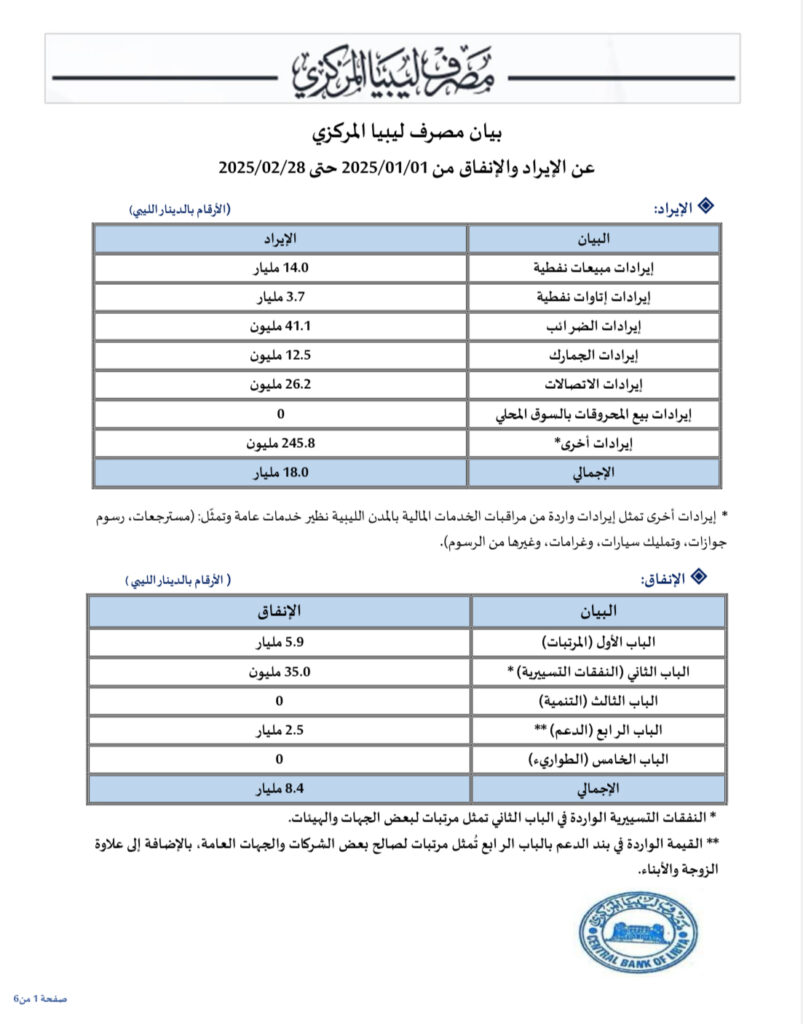Libyan businessman Husni Bey stated exclusively to our source that when the Central Bank of Libya’s monthly report for February was released, detailing government revenue and expenditure in Libyan dinars, it showed a surplus in the general budget—even when adding February’s salaries, estimated at 5 billion dinars, which were not included in the report.
He continued that what alarmed many was the section on the balance of payments, particularly the trade balance denominated in foreign currency, which revealed a deficit of $2.4 billion as of late February 2025. The bigger shock came from the significant rise in dollar sales, especially for personal purposes, which surged by over 90%, while the general rate of letters of credit increased by 30% compared to the highest levels of previous years.
He emphasized that concerns arose due to an overall 65% growth in foreign currency sales compared to the highest monthly averages of past years. This sharp rise in currency sales raised alarm bells for many, but in his view, the indicators, while surprising to some, are not unusual and can be explained as follows. Between 2023 and 2024, the Central Bank of Libya accumulated nearly $8 billion in reserves in gold and dollars. However, during the same period, 39 billion dinars were created, in addition to 7 billion dinars printed after the August 2024 central bank crisis and earlier due to the shutdown of the Sharara oil field. These disruptions hindered oil exports and reduced revenues, leading to a budget deficit in the latter half of 2024. In total, 46 billion dinars were created over 24 months. This expansion in the money supply and the monetary base, representing the central bank’s debt, fueled the growing demand for dollars.
He explained that these newly created 46 billion dinars have been chasing the 8 billion dollars accumulated in 2023 and the first quarter of 2024.
He added that to restore balance and curb the money supply, the Central Bank of Libya may have to reevaluate the dinar’s exchange rate to absorb the excess liquidity. Unfortunately, the 27% tax on dollar sales imposed in April 2024 by the House of Representatives was meant to absorb the surge in money supply, which ideally should have been achieved by adjusting the exchange rate to absorb the 39 + 7 = 46 billion dinars. However, due to lawsuits and public pressure, the Central Bank of Libya reduced the tax to 15%.
He noted that lowering the tax to 15% created a 12% gap between the official and parallel exchange rates, encouraging speculators to profit from the difference, which amounted to $480 million, equivalent to over 2.9 billion dinars.
He stressed that the 12% gap between the official and parallel rates was a key driver of speculation and rising demand for dollars. As a result, dollar demand surged to $6 billion within 59 days, with $3 billion allocated for personal purposes and $2.5 billion for letters of credit. He pointed out that for the first time in Libya’s history, personal dollar allocations exceeded business credit allocations by more than 20%.
He posed the question of what should be done. Maintaining the current exchange rate and tax would mean absorbing the 46 billion dinars at the cost of sacrificing the $8 billion accumulated in 2023 and early 2024, which he does not recommend. Changing the exchange rate to absorb the 46 billion dinars is the solution he strongly supports, regardless of the cost, provided that the government and future administrations commit to restraining public spending.
He concluded that regardless of the approach taken, for the Central Bank of Libya’s policies and plans to succeed, government spending must be unified under an approved budget, expenditure must be reduced and rationalized, fuel subsidies—which cost $14 billion annually and are subject to theft, smuggling, and misuse—must be addressed, and government spending must not exceed annual revenues. Otherwise, the primary culprits will be the legislative and executive authorities.


















